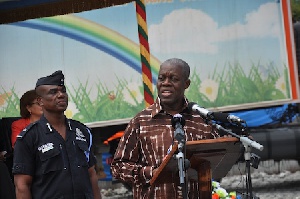Vice President Kwesi Amissah-Arthur has called on Ghanaians to be aware of their civic responsibility and be interested in helping to keep their communities clean.
He said the monthly clean up exercises should not just be in the cities but also a re-awakening of the communal spirit that characterised rural communities.
Vice President Kwesi Amissah-Arthur made the call when he inaugurated a Zoompak Waste Transfer Station and Medical Waste Treatment Facility at Teshie in the Greater Accra Region.
The two facilities which cost $7 million have the capacity to handle 1,300 tons of waste daily from the capital.
The objective of the project is to ensure that the waste transfer station serves as a transit point to facilitate the delivery of quality waste management services to the populace.
Besides, the medical waste treatment facility is to manage all the medical waste generated by the healthcare facilities with ultra-modern technologies.
Vice President Amissah-Arthur noted that a year ago, the government instituted the monthly National Sanitation Day clean-up programme which was embraced by many communities.
He stated that the issue of proper sanitation and waste management is a collective responsibility.
He said while the government is making the needed investments to improve waste management and sanitation, citizens also have a role to safeguard their own lives by placing their waste not in gutters but in bins so that it could be carted off to designated disposal sites.
Vice President Amissah-Arthur also called on chiefs and opinion leaders to take up the challenge and to lead the charge in ensuring that people keep Ghana clean.
He commended the management of Zoomlion and Jospong Group of Companies for their initiative and the collaboration with foreign partners for the establishment of the station.
He expressed confidence that the facility would help bring efficiency to the waste collection efforts and reduce significantly the wastes that is engulfing the city.
Mr Nii Lante Vanderpuje, Deputy Minister of Local Government and Rural Development commended the management of ZOOMPAK for the initiative.
He said waste management is becoming a daunting challenge with its concomitant effect on growth and development.
He said solid waste generated in Accra is more than 2500 metric tons and is hauled for about 32 kilometres to its final disposal sites.
Mr Vanderpuje said the location of the transfer station in Teshie is timely and strategic since the facility would serve as a critical link in making cost-effective, the work of waste management in the region.
He said transferring waste to the facility would reduce the daily pressure on the various landfill sites, adding that it has been a long awaited appealing alternative.
He cautioned the management of ZOOMPAK to ensure that in the cause of operations the pieces of waste, which would litter around the station, are reduced to the barest minimum.
Dr Joseph Siaw Agyepong, Chairman and Chief Executive of Zoomlion and Jospong Group of Companies commended President John Dramani Mahama and Vice President Amissah-Arthur for their support for the project.
He explained that the transfer station was borne out of the President and Vice President Amissah-Arthur's vision to create a healthy environment for Ghanaian and also to maintain proper sanitation in the country.
He said this was shown when Vice President Amissah-Arthur joined the cleanup exercise at Agbogboloshie when there was a sanitation challenge and also supported the construction of the Kokomlemle transfer station
Dr Agyepong also stated that over the years the company has made significant investments in the waste management sector not just because of the business opportunities that it provides but as a contribution to good public health.
He said the waste transfer station is dumping ground for all the tricycles and many waste collection vehicles so that the waste could be treated and compacted and then sent to landfill sites.
This means that it would reduce the turnaround times of the of the small waste collection vehicles, especially as they would no longer have to travel long distances to dump their waste at landfill sites.
Dr Agyepong also stated the facility which is ISO certified has the technology for handling medical waste, which requires special expertise and technical know-how.
He called on the local assemblies to enforce the laws on sanitation by ensuring that all residential facilities are made to have refuse bins so that there could be a coordinated approach to waste collection.
General News of Sunday, 28 June 2015
Source: GNA













